Overview
This application is available to most users. The main purpose is to increase integrity and control over budget usage. The application allows you to raise electronic requisitions but limits the number of people who can approve those requisitions.
Cost accountants cannot select the originator's responsibility when changing the budget holder/approver of the e-req.
The parameter (ONLINE_REQ_FORCE_RESP) will enable or disable the selection of the supervisor responsibility.
Typical Users
Risks Factors
Function
When opened you will view the following Capture E-requisition screen:
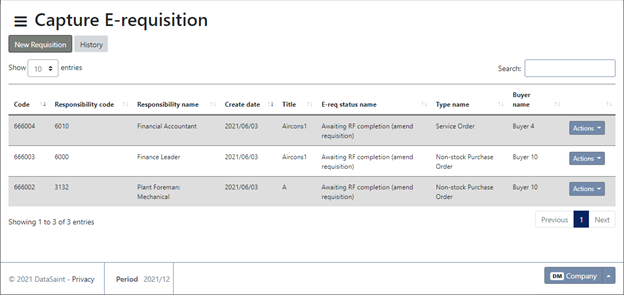
Click on the 'New Requisition' button.
Select the requisition type from the options screen to continue to the capture screen. The types shown on the selection screen will differ as per client requirement. The types are set up using the Profile Maintenance application.
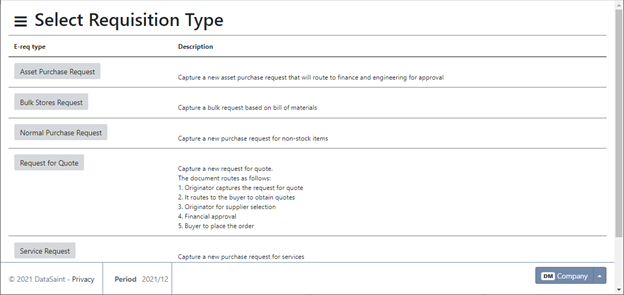
Select the required information using the drop down lists or enter it manually:
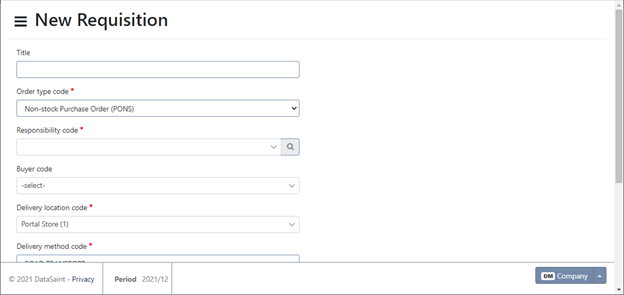
Once completed, click on 'Add line' to add lines to the e-Req. Required fields are marked with an asterisk (*).
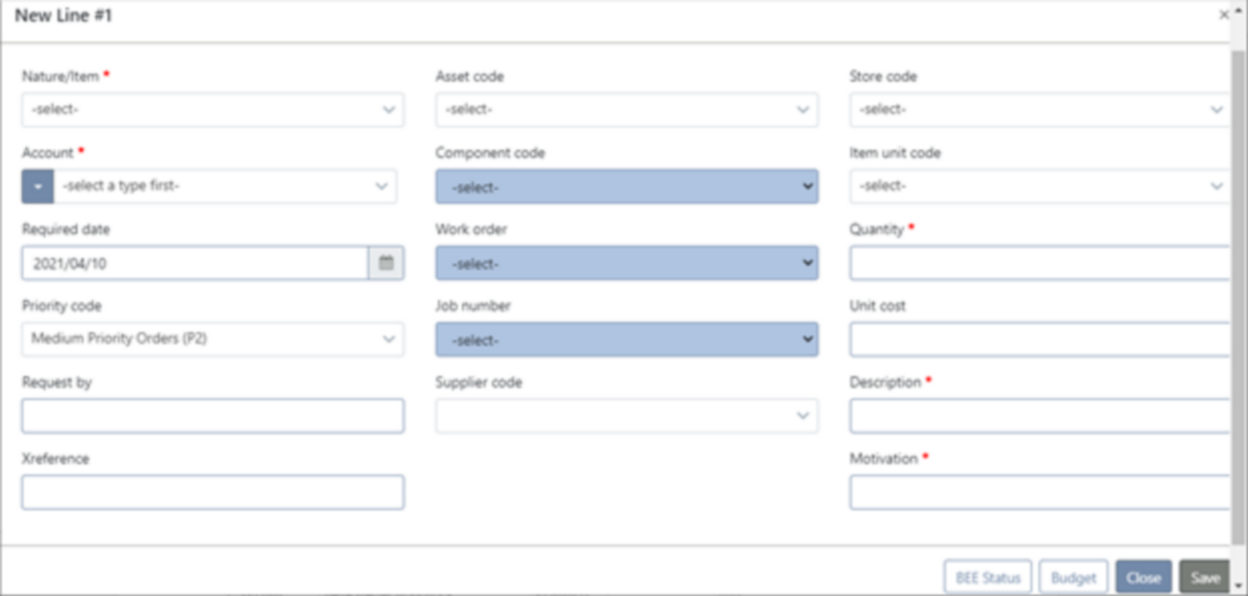
After all the required information has been captured, click on the 'Save' button to add.
Order type
A specific order type should be selected and forms part of the prefix to an order. Order types available for selection is dependent on client specific set up.
Responsibility
This is the responsibility of the budget holder who will be approving the requisition.
Item Code
This is the item you are capturing the requisition for.
Account
This can either be a cost centre, ledger, debtor, or project account. Only account ranges that have been assigned to the responsibility number will be available for selection.
Nature
Only nature ranges that have been assigned to the responsibility number will be available for selection. The Nature field won’t always be available/displayed. This is determined by a parameter, value can be I for Item Code, N for Nature or B for both.
Asset code
This field is used to link assets to the requisition you are capturing.
DeltaERP has 3 options regarding the data in the asset picker.
The assets available for selection can be filtered as follows:
• No filter on assets. Work Order to be filtered by Responsibility Code
• Filter asset by account selected, Work Orders by asset selected.
• No filter on assets, filter Work Orders by the selected asset.
Component
Components are linked to specific maintainable assets. Once you have selected an asset, only components linked to the selected asset will be available for selection.
Work order
Selecting a work order will populate the asset code and responsibility number as specified on the selected work order.
Job no
Selecting a job number linked to a specific work order will populate the asset/component specified on the job card and expenses will be recorded against the cost centre linked to the asset code.
Buyer
Buyers not marked as Can Select when Capturing using the Procurement Master File Maintenance application (Buyer Level tab), will not be available for selection when capturing requisitions.
Store
This is the store if the item selected. It will default to a Non-stock Store if you are capturing non-stock items.
Required Date
This is the date by when the item is required. The default date populated is determined by parameters ONLINE_REQ_PURREQLEADTIME and ONLINE_REQ_ISSUELEADTIME. This date can be changed to any date but cannot be back dated.
XRef
This is an external reference field. This can be used to refer documents, invoices, quotes, etc.
Requested By
This is the person who originally requested the item for which the requisition is being captured.
Supplier
A preferred or unallocated supplier may be selected.
Delivery Location
This is the location where the item should be delivered to.
Delivery Method
The delivery method determines how the items will be delivered. Freight provision can be linked to the different delivery methods. A certain percentage freight provision can be linked using the Procurement Master Files application, Delivery Methods tab.
Title
This is the title of the requisition. It could be a brief description.
Motivation
Motivate why the item is required. This is not a compulsory field but could be required based on company policy.
Description
This is a required field. Give a description of why the item is required. Expand on the title/motivation fields.
Item Unit
This is the unit of measure used for the selected item. The item types available for selection can be maintained using the Stores Maintenance application > Item Types tab.
Quantity
This is the actual quantity of the item required.
Unit Price
The unit price per item excluding VAT.
Currency
This is the currency in which the supplier invoice is received.
Value
This field will automatically be calculated based on the quantity and unit price field values. It cannot be edited.
Contact Number
This is the contact number of the person whose name was filled in in the Requested By field.
Contract Number
If the item on the requisition is on contract, select the applicable contract number or enter it manually.
Priority
The priority determines how urgent the item on order is. This can range from low priority to emergency orders depending on company setup. The priorities available for selection is set up using the
Order delivered indicator
With this option selected, the user states that the order has been delivered already. The requisition will still follow the normal approval process and create an order for the buyer to release but doesn't require any expediting. This will only be an indication to the buyer to not place the order to the supplier for delivery (again) – indication will be a highlighted order in Order Confirmation with a green colour.
To view the budget information, click on the 'Budget' button.
The 'BEE Status' button will display the BEE information relating to the supplier.
The 'Close' button will close the screen and not save any of the information entered. When you've closed this screen, to select a new responsibility, you have to click on the 'New' button.
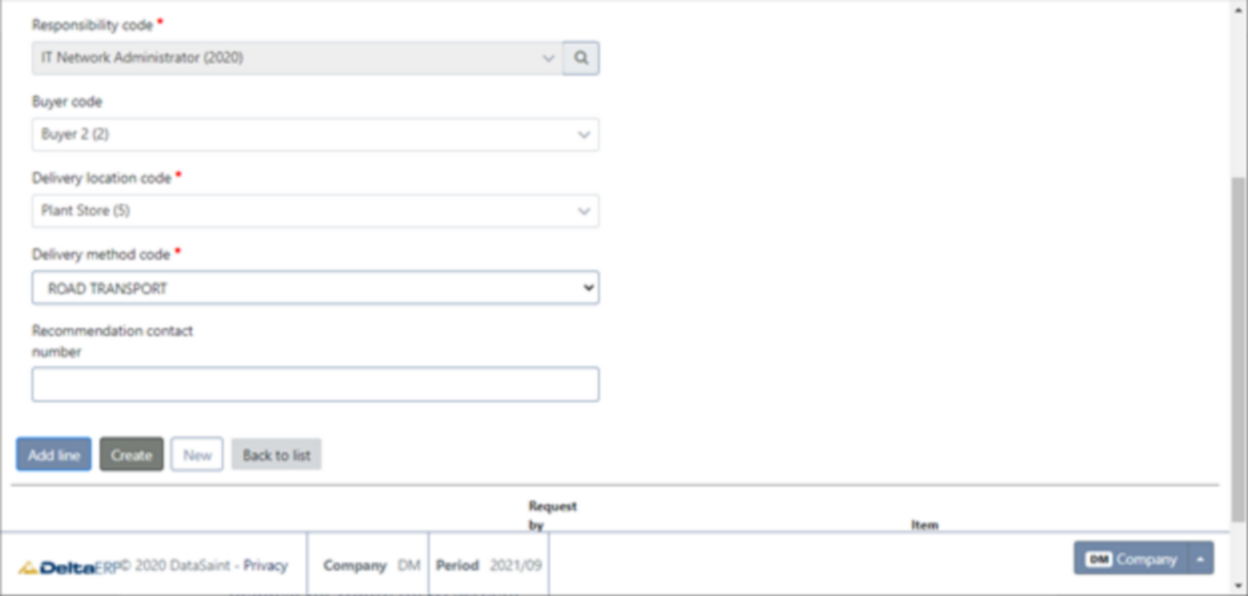
Once everything has been captured, click on the 'Create' button to save the requisition and forward for approval. Keep the requisition number for reference purposes.
Request for Quote (RFQ):
Multiple currencies can be captured in one RFQ. Each line can have its own currency. When the RFQ is finalised and sent for approval, it will split into 2 or more requisitions (depending on how many different currencies have been captured) before routing for approval.
Note that this depends on your specific Workflow set up – it could be that the RFQ will first route to the buyer to obtain quotes and then be sent for financial approval.
Once the supervisor has approved the RFQ, the requisition is sent to the selected buyer to gather quotes.
Service Requisition:
Service requisitions will always be qty 1 and this cannot be changed.
Stores Issue Requisition Capture:
Client set up and requirements will determine if one or more issue type will be available in the Order Type picker.
The Stores Issue option has transaction types for items loaned out and in from one company to another. Continue to capture the requisition as normal.
Amend or Delete:
The 'Delete' and 'Edit' ![]() buttons next to each line can be used to delete or amend a line:
buttons next to each line can be used to delete or amend a line:
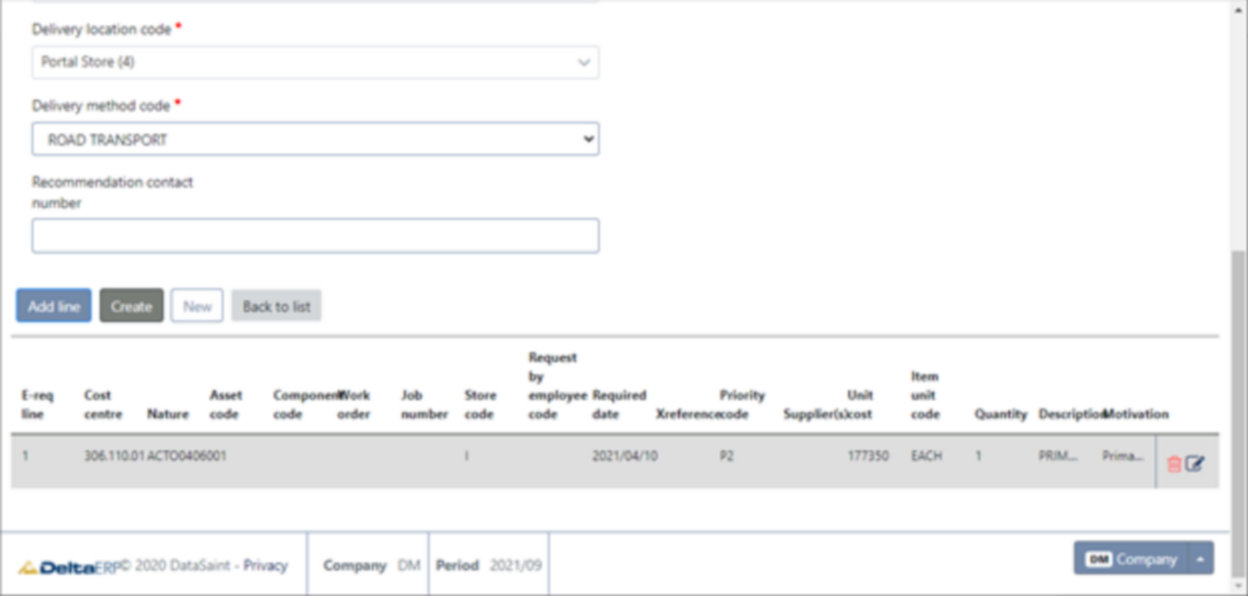
Cancel:
To cancel an existing requisition, select the line item from the Pending Requisitions tab:
Reinstate:
To Reinstate a previously cancelled or rejected requisition,
amend the information or attach additional documentation to be sent for approval. A new e-Req number is assigned to the re-instated requisition.
Copy:
To copy an existing requisition, and amend the information or attach additional documentation to be sent for approval. A new e-Req number is assigned to the re-instated requisition.
e-Requisition Types
Requisition Type |
Order Type |
Description |
PURREQ |
BREAKDOWN |
Breakdown |
|
PONC |
Purchase Order Non-Stock Contract |
|
PONR |
Repair Non-Stock with Serial Number |
|
PONS |
Normal Purchase Requisition |
|
PONX |
Repair Non-Stock with no Serial Number |
|
PROJ |
Project Orders |
|
PROJSERV |
Project Service Orders |
|
REPAIR |
On Site Repair Requisitions |
|
SERVICE |
Service Request |
QUOTE |
QUOTE |
Request for quote |
|
SERVICE |
Service Purchase Requisition |
SERVICE |
SERVICE |
Service Purchase Requisition |
ISSUE |
CLOAN |
Credit Stock Loaned Out |
|
ISSUE |
Store Issue |
|
LOAN |
Stock Loaned Out |
EPR |
Q001 |
General Electric Payment Request |
|
Q002 |
Travel Advances |
|
Q003 |
Supplier Advance Payments |